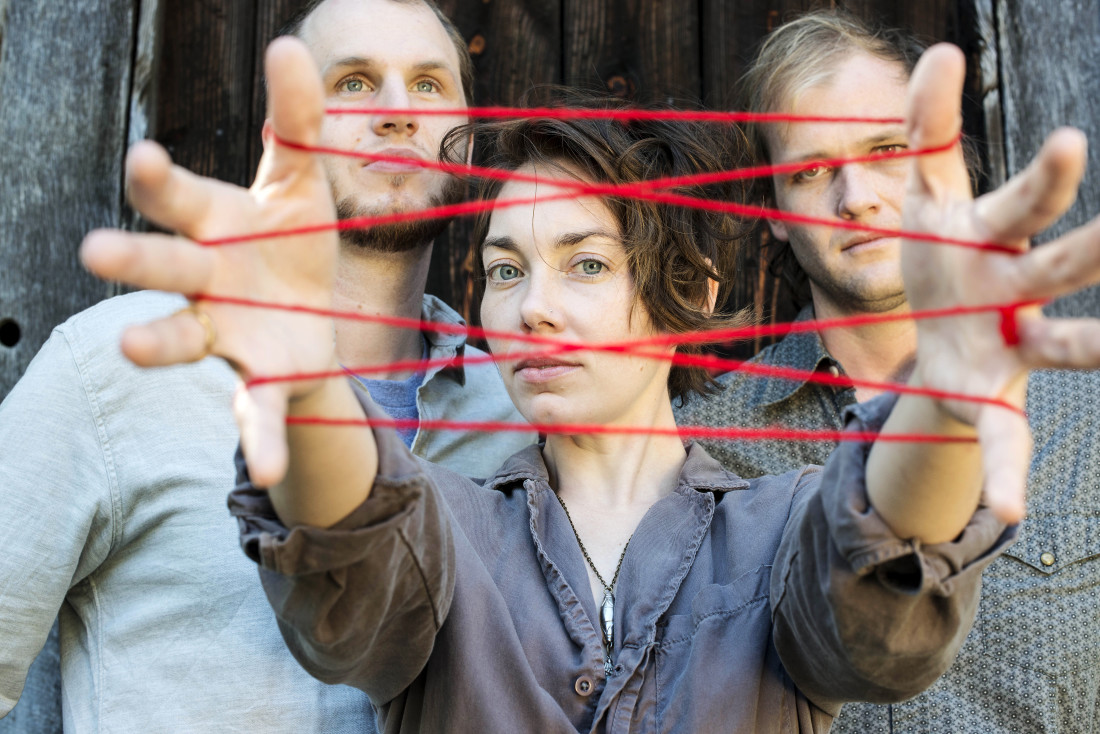There’s something primal, even elemental, about the sound Heather McEntire and Jenks Miller make together in Chapel Hill-based Mount Moriah.
Although the Southern-inflected indie-rock music the two musicians conjure is often sophisticated and restrained, the blend of McEntire’s weary vocals and Miller’s meandering guitar lines are permeated by the North Carolina landscape, all gnarled roots and lonesome highways. It’s an evasive sound, one that feels more like a whispered cry of anguish than a declaration of intention. It’s a music fully invested in the richness of the soil it comes from.
The group, which also includes bassist Casey Tolls, returns to Asheville on Friday, March 25, for a headlining gig at The Mothlight. Mount Moriah is touring in support of the recently released LP (the band’s second on Merge Records), How to Dance, a record that seems to both expand and deepen the musicians’ singular, progressive vision of what roots-rock can be.
Still, Miller is quick to place Mount Moriah in the context of his region’s music history. “I think we are, by any definition, a Southern rock band,” he says. “I think there’s always been a very progressive element in the South. … Although it’s stereotyped as backwards, redneck music, there’s always been a very strong progressive undercurrent in folk music, country music and in Southern rock.”
But McEntire and Miller both come from unlikely musical places. The singer previously fronted the post-punk renegade Bellafea, while the guitarist crafted sprawling, often droning compositions in the heavy-psych/metal band Horseback. Those backgrounds can be felt in Mount Moriah’s music, particularly on How to Dance. The band’s latest effort often tries on more propulsive arrangements and grittier, cagier guitar lines that feel worlds away from what an Allman Brothers cover band would come up with.
For all of their unorthodoxy, though, Miller sees the music as true to who he and his bandmates are. “There’s nothing false about what we’re doing,” he says. “Heather and I both grew up in North Carolina. Heather grew up in the mountains, and I grew up in the Piedmont. And we were both exposed to Appalachian music, bluegrass music and country music as kids. It’s part of who we are, and we’ve always loved it.”
He continues, “That being said, we also have a lot of space for other sounds. Heather was in a punk band for a long time. I have a metal band that’s still active. Neither one of us is interested in just one sound or one approach to writing or music-making. We are totally comfortable being unorthodox, but that’s not to say it’s an affectation.”
Mount Moriah, which Miller started before he became close friends with McEntire, began as an alter-ego for the heavier and more experimental music he was making in Horseback. “It was this impulse,” he says. “We were getting some of our creative needs met with some more aggressive or confrontational stuff, but we also love the craft of music and the conversation around Southern music and folk music.” When he and McEntire realized they shared a love of traditional American music, “We decided we wanted to investigate that more and wanted to have an outlet for that kind of writing.”
What began as a needed creative outlet quickly became something more. Miller recalls the band’s first performance with a bit of awe in his voice. “There are so few times in my life where I’ve actually been totally transported when playing music,” he says. “It happens, but it’s rare. The first phrase we played in that show was electrifying, and it felt so much bigger than what any one of us was contributing. Something clicked, something moved. So it was like, how do we nurture that spark? How we make it grow?”
There’s a palpable current in the group’s sound. It hangs in the air, in between the words and notes as McEntire uses her pliable voice to bend her enigmatic, spirit-searching lyrics toward ineffable possibility. “Heather’s really great at taking real places and injecting them with a kind of magical or supernatural significance, finding new ways to look at places or memories of places,” Miller says. “Take the song ‘Calvander’ [the opening track on How to Dance]. Calvander is a real place, a tiny place — it’s really just one intersection [outside Chapel Hill]. But Heather connects it to this experience, some of which is imagined and tweaked a bit, of a trip that originated from that intersection and took her to the coast. So now that place has a heightened sense of reality — and I really love that about the song.”
WHO: Mount Moriah with Elephant Micah
WHERE: The Mothlight, 701 Haywood Rd., themothlight.com
WHEN: Friday, March 25, 9:30 p.m. $10




Before you comment
The comments section is here to provide a platform for civil dialogue on the issues we face together as a local community. Xpress is committed to offering this platform for all voices, but when the tone of the discussion gets nasty or strays off topic, we believe many people choose not to participate. Xpress editors are determined to moderate comments to ensure a constructive interchange is maintained. All comments judged not to be in keeping with the spirit of civil discourse will be removed and repeat violators will be banned. See here for our terms of service. Thank you for being part of this effort to promote respectful discussion.